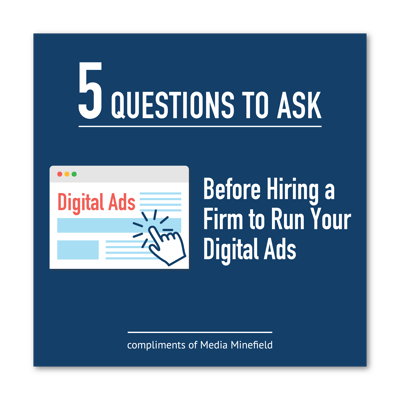It’s a tale as old as digital time. You search for shoes online, and the next time you’re on Facebook, you’re getting ads for shoes. We’ve all experienced this in some form or another but may not understand the reasoning behind it. While most ads are targeted in some way - the location of a billboard or the time of day a commercial runs on television - digital ads are more narrowly targeted and therefore, more efficient and effective. Ads can be geared toward consumers who’ve shown previous interest in the product or service, whose demographics or interests align with the target audience or who are similar to others who’ve shown interest in a particular product or service.
The world of digital advertising has many nuances, but there are some common questions about how the process works.
Q: How does targeting work and where does the information come from?
A: Each platform (Google, Facebook, Instagram, TikTok, YouTube, LinkedIn, etc.) has an algorithm designed to show the ads it thinks are relevant to the consumer. Our goal is to use targeting strategies to reach the ideal audience. This is done in three ways:
+ demographics and interests
+ retargeting
+ lookalike audiences
The information you input on any platform - your birthday, location, interests, job title, etc. - can all be used in targeting. Retargeting is when you’re searching for shoes and an ad pops up for the same shoe company after you’ve searched for them previously. Lookalike audiences are ads targeted at people who are similar to those who have shown interest before. If a coffee company wants new people to visit their shop and try a new drink, they can find those who have purchased coffee before and target others who are similar to them based on shared demographics or interests.
Q: How do you develop a digital ad strategy?
A: Determine your goal. Is it to reach as many people as possible, sell a product or get people to sign up for something? The answer to that question will determine what type of targeting will be most effective. Once you’ve identified your ideal audience, having someone actively optimizing your campaigns will make or break your success. While anyone can set up a digital ad and use the platform’s algorithms, it takes an expert to analyze your campaign performance, optimize your ad spend and tweak the audience and ad creative for the best results. For lead generation, it’s critical to find the sweet spot between cost per lead and qualified leads to make the process as efficient as possible. You want to have the biggest impact with as little ad spend as possible.
Q: What platforms are digital ads used on and are there differences between each one?
A: Digital ads are used on nearly every online platform, from web browsers to streaming services to social media channels. Each platform has different rules and ways of targeting. Some platforms may try to predict what you may be interested in while others will show you ads based on what you are actively searching.
Q: How are digital ads beneficial for companies compared to a billboard, radio or TV ad?
A: Billboards or radio commercials are targeted based on one or two things like location or time of day it’s running. While you may be hitting a key demographic with your ad, you may also be reaching a large group of people who aren’t potential customers. Digital ads are much more targeted and tailored to factor in location, demographics, lookalike audiences and interests. Typically you are also a few clicks away from making a purchase compared to a radio ad or billboard which are providing awareness. Taking all of this into account means you are being more efficient with your ad dollars and who you are targeting.
Q: This can feel creepy - sometimes ads pop up for things you talked about and didn’t search. How does Google know about these things, and why is it good for a consumer?
A: Each platform pulls from the information you input: likes, age, location, your behavior on the site, etc. If you’re logged into Facebook and Google at the same time, your interests and search history could possibly be shared across platforms. The goal in advertising and marketing is to get you to buy that service or product or build awareness for that brand. There’s no way to escape ads, but targeted ads are more likely to pertain to you and your interests. If you are going to receive ads, it’s better to get one that appeals to you.
Businesses are always working to get their names out to more people to build awareness and grow the company. Each day you may see or hear dozens of ads. It is difficult to get around them, but consider this: time is money, and targeted digital ads are most beneficial to you because they are efficient in helping you find the products and services they actually want.
Are you ready to unlock the power and profit of your story?
Media Minefield is here to help! If you’re considering adding digital ads to your marketing plan, click here to access the five questions you need to ask before hiring a firm to execute your advertising strategy.


